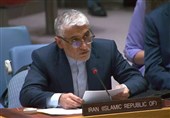Muslim Pilgrims Gather At Mount Arafah in Biggest Post-Pandemic Hajj Pilgrimage
TEHRAN (Tasnim) - Thousands of Muslim pilgrims gathered at Mount Arafat or the Mount of Mercy, at the climax of the biggest Hajj pilgrimage since the pandemic forced drastic cuts in numbers two years in a row.
The Day of Arafah is celebrated on the ninth day of the lunar Hijri month of Dhul Hajja. It is the time when Muslims travel to Mount Arafat, east of Mecca, and stay until sunset, performing prayers and reading the Quran in a ritual known as "Wuquf at Arafat."
In the early hours of Friday, pilgrims converged on Mount Arafat, where Prophet Mohammed (PBUH) have delivered his final sermon.
After sunset, pilgrims will travel to Muzdalifah, halfway between Arafat and Mina, where they will sleep under the stars. They will begin the symbolic "stoning of the devil" ceremony on Saturday.
Pilgrims will then return to the Kaaba for one last "tawaf," or circling, before concluding Hajj with Eid al-Adha.
The Hajj pilgrimage is one of the pillars of Islam that all Muslims should perform at least once in their lives. Muslims typically save for years in order to participate in the event.
The Hajj is a five-day series of religious rites performed in Islam's holiest city, Mecca, and surrounding areas of western Saudi Arabia.
It is also a once-in-a-lifetime duty for all Muslims physically and financially able to make the journey, which takes the faithful along a path traversed by the Prophet Muhammad some 1,400 years ago.
Those performing the ritual this year must be under 65, vaccinated against the coronavirus, and have tested negative for COVID-19 within 72 hours of travel.
Hajj attendees hit 60,000 last year. However, the ritual was restricted to fully vaccinated Muslims who live in Saudi Arabia. The decision shocked Muslims around the globe who typically have to wait for years to make the journey.
Saudi Arabia relaxed restrictions this year as the indoor mask mandate has been lifted. Some 70% of the country’s population have been vaccinated against the virus while the country is recording over 500 daily COVID-19 cases.
Pilgrims at the holy site this year are not required to be masked or socially distanced, as during the past two years. However, Muslims are still prohibited from kissing or touching the cube-shaped Kaaba, the metaphorical house of God at the center of Mecca, which pilgrims circle as they complete the Hajj.





